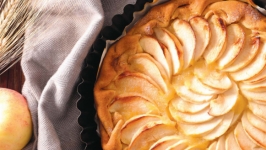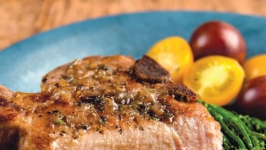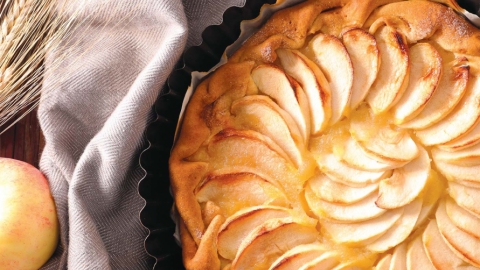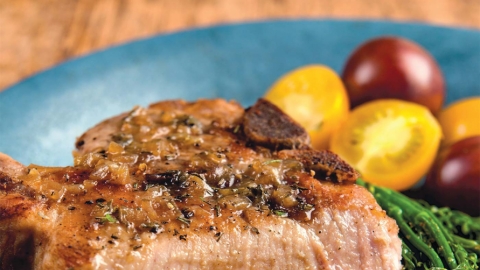Eleanor Leger: Pressing Matters
Great ciders and wines have character and complexity that develop over time. That’s what makes them captivating. The same holds true for the people who make them. Eleanor Leger, founder of Eden Specialty Ciders, spent 20 years in corporate America before shifting gears to make the first ice ciders in the United States. In April 2023, Eden Specialty Ciders joined forces with Shelburne Vineyards and Iapetus Wines to create a trio of likeminded businesses committed to sustainably tending land, fruit, and people. Eleanor serves as CEO of these companies that champion cold-climate wines and ciders made right here in Vermont. Read on to learn about her journey through this world of luscious libations!
Give us a thumbnail origin story.
Eleanor Leger: My husband, Albert, was teaching science at Hopkins School in New Haven, Connecticut and then Philips Exeter Academy in New Hampshire, and I was in corporate America. My job in the early 2000s was based on the West Coast and I was commuting back and forth, which became ridiculous, so I opted out in 2006. That’s right when we decided to buy an abandoned dairy farm in West Charleston in the Northeast Kingdom. My dad’s entire family is buried in West Glover, and I had been coming here for decades. Albert is from Montreal so that’s why we chose to settle in the Northeast Kingdom.
When and how did ice cider enter your realm?
EL: We were visiting family in Montreal at Christmas 2006 and tasted cidre de glace for the first time. We were amazed and felt it could be a true representation of Vermont terroir, with our really cold weather (at least back then) and interesting apples. We thought, wouldn’t it be fun to make some since I was temporarily unemployed? No one else in the United States was focused on producing ice cider at the time. We made our first commercial batch in 2007. By 2009, we were in Boston, New York, DC, Chicago, San Francisco. We’re now one of the top three ice cider producers in the world.
Talk about these award-winning ice ciders and the process of making them.
EL: These sweet-tart dessert ciders are a perfect way to end a meal. Or sip by the fire. A touch of acidity balances the concentrated sweetness, which keeps it from cloying. It takes 8 pounds of apples per 375-ml bottle, and each vintage ages for up to three years. It’s a slow process, but that’s where all the flavor and body develop. Best-sellers include our flagship Heirloom Blend, Honeycrisp Ice Cider, and Northern Spy Ice Cider.
All the apple pressing takes place at the West Charleston farm. Apples are pressed and stored outdoors in vats where—weather permitting—they go through several freeze-and-thaw cycles. Once something is liquid and ready for processing we transport it to our Newport production facility for fermentation.
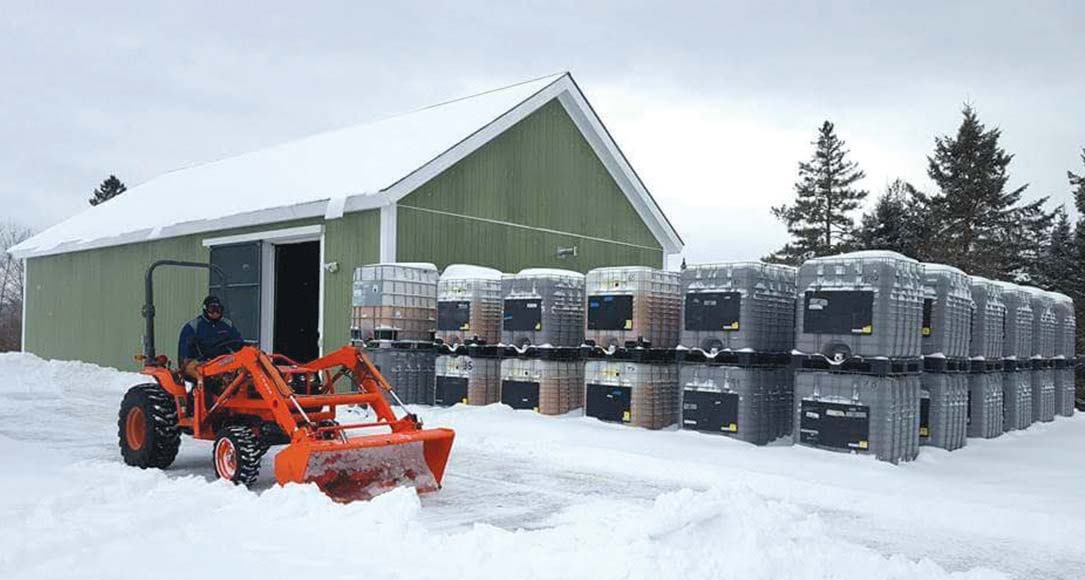
Pressed apples spend winters outside at the West Charleston farm where they go through periods of freezing and thawing that give the ice cider its unique richness. COURTESY EDEN SPECIALTY CIDERS
“We were visiting family in Montreal at Christmas 2006 and tasted cidre de glace for the first time. We were amazed and felt it could be a true representation of Vermont terroir, with our really cold weather (at least back then) and interesting apples.” –Eleanor Leger
Let’s dive in to the soul of your business: the apples.
EL: Grocery store apples are uniform and predictable whereas heirloom cider apples have such personality. Apples have more genetic diversity than humans! That’s why they can adapt to so many environments. Once you step into the realm of heirloom apples, you’ll discover a new world. Some of the apples we work with have sugar levels of 18 to 19 percent, whereas a standard grocery store apple is maybe 12 percent. Our apples have higher acidity and tannins in the flesh, which broaden the flavor profile. We planted 1,000 trees at the farm from 2008 to 2010 with 55 varieties, so we’re always experimenting to see what works well.
In addition to your own trees, where do you source fruit?
EL: We work with 10 partner orchards in Vermont and New Hampshire. Scott Farm Orchard in Dummerston is our original partner dating back to 2007. We’re their largest purchaser of cider apples. Brad Koehler at Windfall Orchard in Cornwall has been supplying us since 2009. He has historic trees and so many unique varieties. We also partner with Yates Family Orchard in Hinesburg, Sunrise Orchard in Cornwall, and Cobble Knoll Orchard in Benson. We’re always open to discover new orchards.
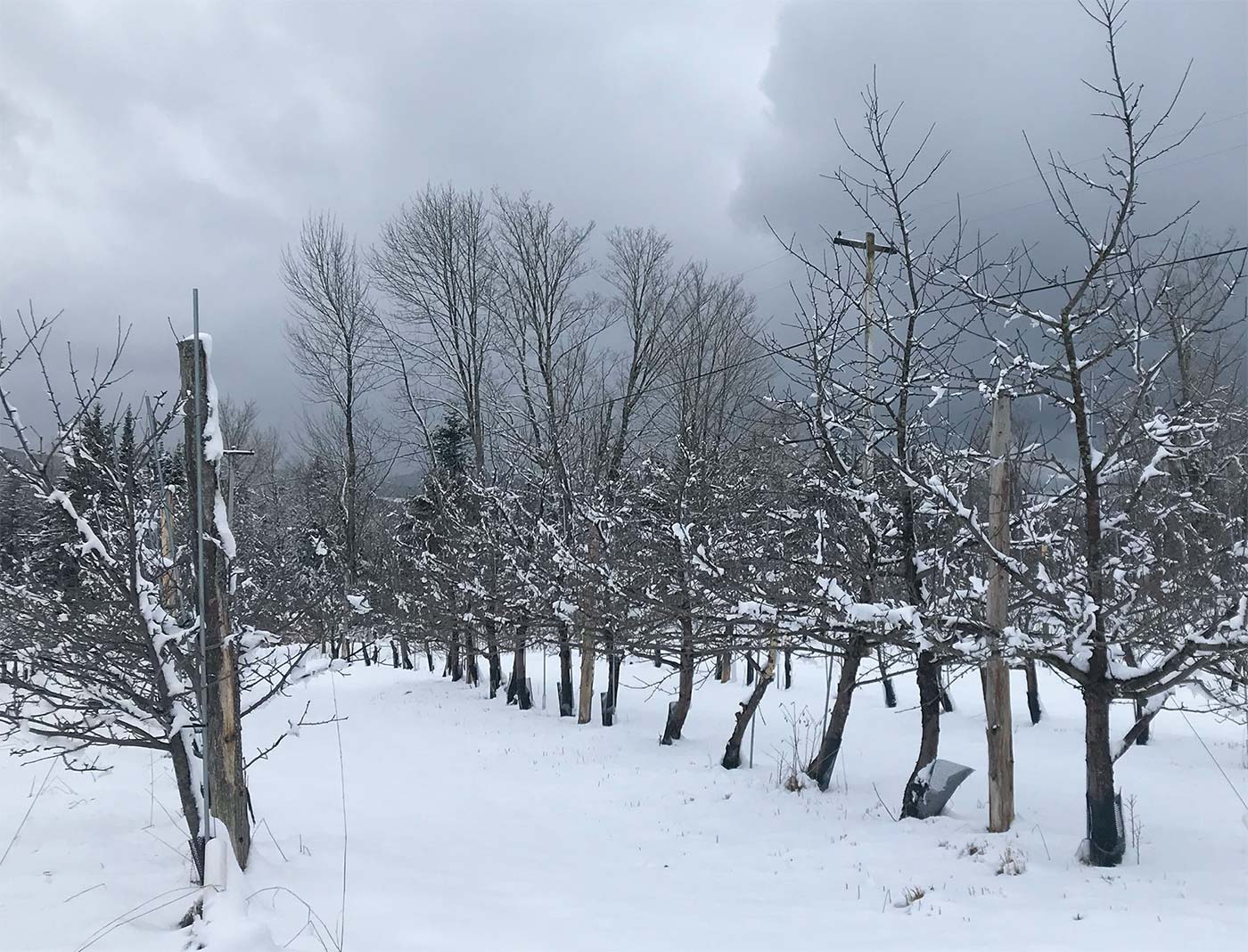
The Legers’ orchard in far northern Vermont in hibernation mode. COURTESY EDEN SPECIALTY CIDERS
“Back in the day, cider and wine were traditionally made in farmhouse cellars because they’re naturally cool with the right humidity level. Our Newport facility still has no heat or air conditioning, so from a sustainability viewpoint, we’re incredibly efficient.” –Eleanor Leger
And then you started making fine ciders in the style of wine?
EL: That’s right. We had been working with all these small orchards whose unique apples would be perfect for dry cider, too. So we started developing our fine cider wines. We produce sparkling, still, and a rosé. Brut Nature is our champagne-method cider that’s truly reminiscent of vintage Champagne. We make it with special apples, let it rest for nearly two years, then disgorge it by hand to remove any sediment. It’s pretty remarkable. Our Wild Kingdom is a 2024 Good Food Award winner; it’s a wild-fermented, dry sparkling cider with aromatic notes. The Imperial 11° Rosé arose from a mud season longing for a glass of Provencal rosé. And we added canned ciders during the pandemic, four delicious and crushable flavors. We would get bored if we did the same thing all the time!
Cider and food pairings?
EL: Nothing goes better with cheese than cider—any cheese, any cider. Cider is a perfect accompaniment to pork and Thanksgiving turkey, light and refreshing on the palate. For festive or holiday meals, we have every part covered! Start with Brut Nature champagne, pour fabulous Shelburne Vineyards or Iapetus natural wines with the various courses or dishes, and finish with a celebratory glass of Eden ice cider.
How about Vermont collabs?
EL: We’re proud of our newly released Honeycrisp ice cider. Jasper Hill Creamery just launched Withersbrook, their natural rind blue cheese soaked in our Honeycrisp ice cider. Phenomenal. We’re also working on an apple brandy with Mimi and Alex at Mad River Distillers. And we make Orleans, a cider aperitif, with Deirdre Heekin and La Garagista.
Looking backward, what was your learning curve?
EL: I was temporarily unemployed—or so I thought, at least—when we started in 2007 so I had time and energy on my hands to throw into the project. I visited orchards, tasted lots of cider, and took an advanced cider-making workshop at Cornell. My goal there was to learn enough of the science to be able to make something as naturally as possible that would beautifully express the fruit. Albert has a doctorate in chemistry and I’m math-science oriented, so all the chemistry and microbiology were interesting to us. We have access to so many unique apples here and learning about new varieties has become our passion.
Any mentors along the way?
EL: Early on, we consulted with a small operation in Quebec that was familiar with ice cider so that was super helpful. Steve Wood of Farnum Hill Cider in New Hampshire was the first person to create high-quality cider using European variety cider apples. He’s been wonderful and isn’t shy about offering his advice, opinion, and assistance. Diane Flynt, one of the pioneers in fine cider and cider apples, lives in the Blue Ridge Mountains; she’s an amazing author and resource on the subject. We’ve made a great connection with her over the years.
Transitional moments?
EL: For five years, we had been humming along, and then in 2012, we had to decide: was this project a hobby or a viable business? We committed to further developing it into a real business; we wanted Eden Specialty Ciders to become an economic engine for the Northeast Kingdom. Expanding our operation required us to move production from West Charleston into a larger space. Our farm is a mile up a dead-end dirt road that closes to truck traffic for eight weeks of mud season each spring.
In 2013, we found an abandoned department store in downtown Newport that had a lower level with a freight elevator and a loading dock out back. We convened a group of people who cared about Newport, bought the building, did a minimal renovation, and went from our 800-square-foot basement to an almost 8,000-square-foot ground-level facility! Back in the day, cider and wine were traditionally made in farmhouse cellars because they’re naturally cool with the right humidity level. Our Newport facility still has no heat or air conditioning, so from a sustainability viewpoint, we’re incredibly efficient.
We were able to process the 2013 harvest in Newport for both ice and dry ciders. Albert left Exeter for two years to set up our operation in downtown Newport. Then he discovered he missed working with teenagers so he went back to teaching at Exeter.
“I’m so happy to see greater recognition of the work that women in Vermont wine and cider [production] are undertaking. ” –Eleanor Leger
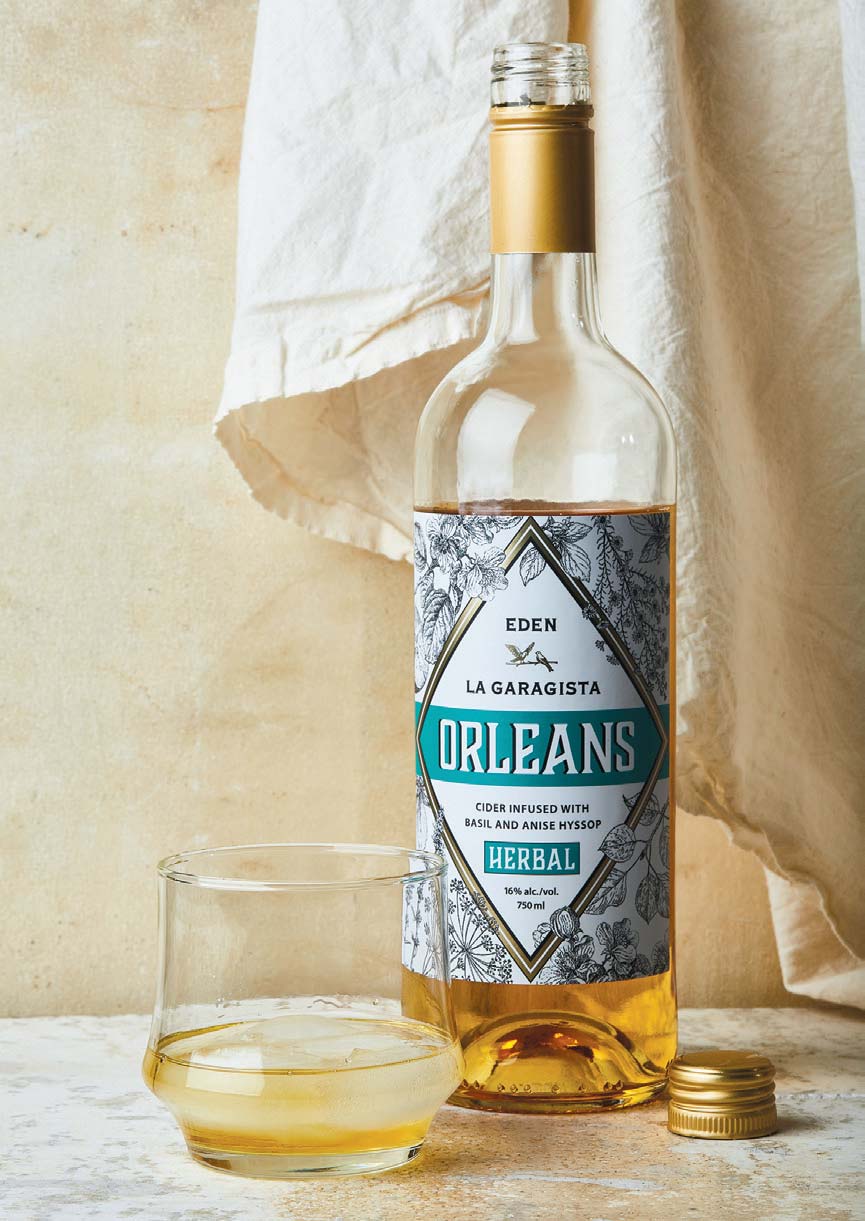
Orleans, a cider-based aperitif, is a collaboration between Eden Specialty Ciders and La Garagista Vineyard. PHOTO BY ELLEN MARY CRONIN
Have you seen more women in leadership roles in cider and wine?
EL: For sure, especially in the fine cider [industry] across the country. Because this is a relatively new industry, there’s space for women and new producers to rise and make an impact. As for wine, I have the highest respect for Deirdre Heekin of La Garagista Vineyard. We’ve known each other for years, and I have incredible admiration for what she’s created in natural wines and co-ferments. Thanks in large part to her, Vermont is getting noticed as a legitimate wine region. I’m so happy to see greater recognition of the work that women in Vermont wine and cider [production] are undertaking.
Let’s talk about the April 2023 merger of Shelburne Vineyards, Iapetus, and Eden Cider. How did that come to be?
EL: I’ve known Ken and Gail Albert, founders of Shelburne Vineyards, for years. We were early members of the Vermont Grape & Wine Council; Ken was president and I was treasurer. So we attended lots of events together and became good friends and colleagues. We’ve always shared the same values around respecting the fruit, taking care of the land and people, and making as high-quality products as possible. As Ken and Gail decided it was time to step back and transition running the business, it made sense for me to step up and become CEO of the combined organization.
Advice to future or current entrepreneurs?
EL: Go work in the kind of operation you think you want to build and really experience what it takes. A lot of people—and I was guilty of this myself—get this vision of this beautiful thing they’re going to create, and they start charging down that path and don’t want to listen to anyone else.
If you want to produce something, hold off investing in expensive equipment. Start by making some batches, figure out what it takes and whether you like all aspects of the process, and see if you can sell 100 cases of it before you buy anything you might not need.
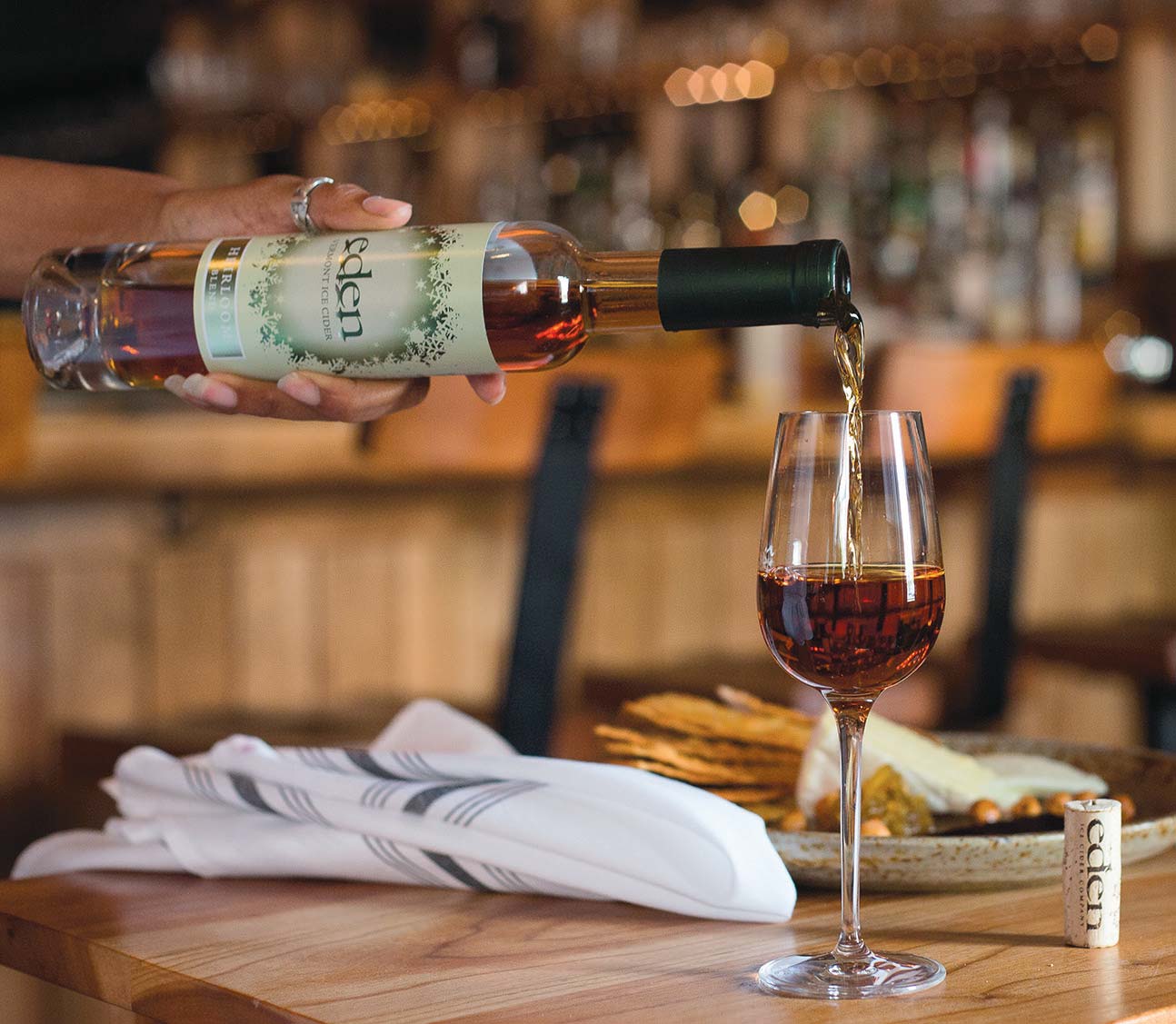
COURTESY EDEN SPECIALTY CIDERS
ELEANOR LEGER’S FAVORITE CIDER & VERMONT CHEESE PAIRINGS
Brut Nature Champagne-method Dry Cider with washed rind cheeses such as Willoughby (Jasper Hill Farm).
Peak Bloom Cider with Mt. Alice Camembert (Von Trapp Farmstead). This Normandy cheese variety pairs incredibly well with a fruit-forward, off-dry cider.
Brut Rosé or Imperial 11° Rosé Cider with goat cheeses (Lazy Lady Creamery). The red currant in this cider is a fantastic pairing with fresh and aged goat cheeses.
Ice ciders and aged Vermont cheddars.
Honeycrisp Ice Cider & Withersbrook, a match made in heaven at Jasper Hill!



